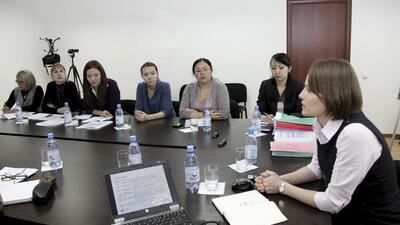
Exportations de produits alimentaires et agricoles de Trinité-et-Tobago touchées par les mesures non-tarifaires (en)
Companies in Trinidad and Tobago who export food and agri-based products, such as milk, fruit juices and spices, are seriously affected by non-tariff measures (NTMs), with 40% reporting difficulties, according to a survey by the International Trade Centre (ITC). Around 30% of exporters of wood, wood and paper products said they face barriers to trade from NTMs, while 24% of businesses involved in the export of chemicals said they are similarly affected.
The findings of the study and how to address NTMs and other barriers to trade were discussed at a workshop in Trinidad and Tobago on 1 March. The workshop was organized by ITC in collaboration with Trinidad and Tobago’s Ministry of Trade, Industry and Investment, and brought together some 60 participants from both the public and private sectors, including producers, exporters and importers.
Caribbean obstacles
The survey of 500 businesses showed that the most burdensome NTMs are applied by partner countries, with 240 cases highlighted, while 67 were imposed by Trinidad and Tobago. Half of the companies who took part in the survey said that most obstacles are within the Caribbean Community (CARICOM), particularly in Barbados and Jamaica.
NTMs, which include import quotas, special licences, export restrictions, export subsidies, technical barriers to trade, sanitary and phytosanitary measures, and rules of origin, have become a principal impediment to international trade and can prove to be a major obstacle to local, regional and global trade in both goods and services as companies struggle to comply with an increasingly complex web of policies and at times opaque technical standards.
Among the topics discussed by experts at the workshop were how to reduce delays in the inspection processes of government agencies and how to negotiate more favourable agreements at the bilateral, regional and international levels. It was agreed that the results of the survey will be used as an input into the national strategy of the country which is currently being prepared by the Ministry of Trade, Industry and Investment, as well as the national aid-for-trade strategy.
Greater transparency
Sandra Indar, Permanent Secretary at the Ministry of Trade, said: “The identification of the obstacles to trade will allow us to achieve greater transparency about business practices, regulations and requirements and could reduce the domestic barriers to trade, thus promoting the ease of doing business in the country.”
Poonam Mohun, ITC’s NTM Programme Manager, said: “The results of the survey will undoubtedly help Trinidad and Tobago better negotiate with partners for the reduction/elimination of non-tariff barriers, especially as the country moves forward with current trade negotiations in neighbouring countries, such as those in the Latin American region.”
ITC is working with the private sector in 27 countries, including Trinidad and Tobago, to identify barriers to trade and provide advice to governments on how to overcome and reduce them. Understanding enterprises’ key concerns with NTMs can assist governments to better define national strategies and policies and take concrete steps to alleviate the problems, for example by building national capacity in complying with technical regulations.








